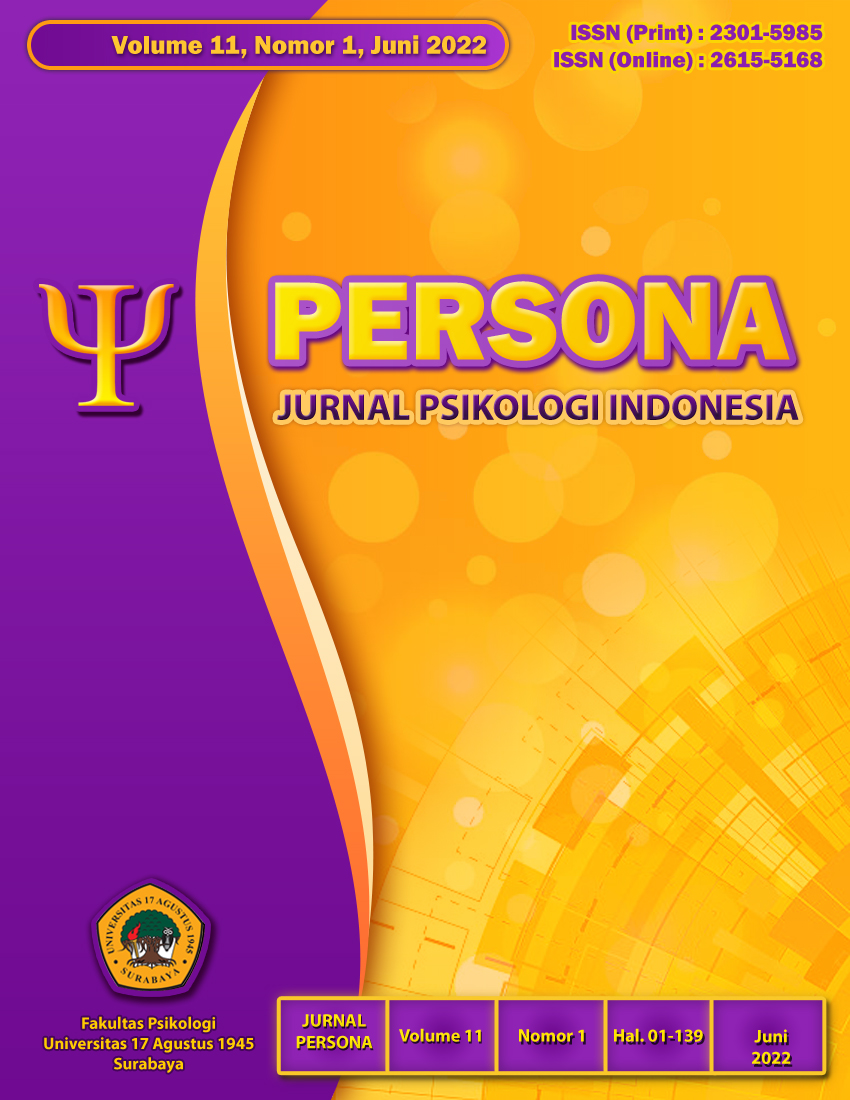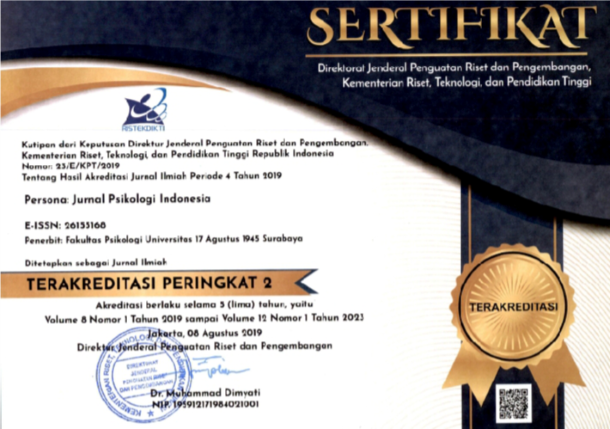Gambaran social self-efficacy, self-disclosure, dan status pertemanan pada mahasiswa baru
Abstract
Abstract
Due to the social restrictions during the covid-19 pandemic, making friends has become a challenge for students studying from home. This study aims to describe and examine the correlation between self-disclosure, social self-efficacy, and friendship status. Participants (N = 221) were freshman students of the 2021 cohort from Universities in Jabodetabek. Data was collected with convenience sampling and analysed using descriptive analysis and correlation. The measurement instrument used in this study was Self-Efficacy Scale in Personal Relationship (α=0.927), the Revised Self-Disclosure Scale (α=0.801), and the friendship status category. Results indicate that social self-efficacy and self-disclosure were fairly high among freshman students and the majority of friendship status was in the first initiation step. One-Way ANOVA showed that there is a significant difference in social self-efficacy and self-disclosure between friendship status. Spearman Correlation showed that there is a significant positive correlation between social self-efficacy, self-disclosure, and friendship status.
Keywords: freshman college students; friendship status; self-disclosure; social self-efficacy
Abstrak
Pandemi Covid-19 membuat pembentukan pertemanan semakin menantang karena interaksi mahasiswa mayoritas dilaksanakan secara daring. Penelitian ini bertujuan untuk melihat gambaran social self-efficacy (SSE), self-disclosure, dan status pertemanan dalam membangun pertemanan pada mahasiswa baru angkatan 2021 di Jabodetabek. Penelitian ini merupakan penelitian kuantitatif komparasi dan korelasi. Instrumen penelitian menggunakan alat ukur Self-Efficacy Scale in Personal Relationship (α=0.927), Revised Self-Disclosure Scale (α=0.801), dan Kategori Status Pertemanan yang telah melalui proses adaptasi dengan expert judgement dan face validity. Responden terdiri dari 221 mahasiswa baru dari universitas di Jabodetabek yang dipilih dengan teknik convenience sampling. Berdasarkan analisis statistik deskriptif ditemukan bahwa SSE dan self-disclosure pada kategori cukup tinggi, dan status pertemanan berada pada tahap pertama yaitu inisiasi. Uji One-Way ANOVA menunjukkan terdapat perbedaan signifikan pada SSE dan self-disclosure berdasarkan status pertemanan. Uji Korelasi Spearman ditemukan hubungan positif yang signifikan antara SSE dengan self-disclosure, SSE dengan status pertemanan, dan self-disclosure dengan status pertemanan.
Keywords: mahasiswa baru; self-disclosure; social self-efficacy; status pertemanan
Downloads
References
Almquist, Y., Östberg, V., Rostila, M., Edling, C., & Rydgren, J. (2014). Friendship network characteristics and psychological well-being in late adolescence: Exploring differences by gender and gender composition. Scandinavian Journal of Public Health, 42(2), 146–154. https://doi.org/10.1177/1403494813510793
Aryani, F., & Umar, N. F. (2020). Factors affecting Z generation on selecting majors in the university: An Indonesian case. Journal of Social Studies Education Research, 3, 109–133. www.jsser.org
Bailey, L. C. (2014). Disclosure decision model: Analysis of private and workplace friendships. (Publication No. 1561740) [Master’s thesis, Wake Forest] ProQuest Dissertations Publishing University] https://www.proquest.com/openview/7413c9ed4f71ccaf9c2baff8c6ca1338/1?pq-origsite=gscholar&cbl=18750
Bazarova, N. N., & Choi, Y. H. (2014). Self-disclosure in social media: Extending the functional approach to disclosure motivations and characteristics on social network sites. Journal of Communication, 64(4), 635–657. https://doi.org/10.1111/jcom.12106
Bencsik, A., Juhász, T., & Horváth-Csikós, G. (2016). Y and Z generations at Workplaces. Journal of Competitiveness, 6(3), 90–106. https://doi.org/10.7441/joc.2016.03.06
Bilgin, M., & Akkapulu, E. (2007). Some variables predicting social self-efficacy expectation. Social Behavior and Personality, 35(6), 777–788. https://doi.org/10.2224/sbp.2007.35.6.777
Charalambous, M. (2020). Variation in transition to university of life science students: Exploring the role of academic and social self-efficacy. Journal of Further and Higher Education, 44(10), 1419–1432. https://doi.org/10.1080/0309877X.2019.1690642
Chicca, J., & Shellenbarger, T. (2018). Connecting with generation Z: Approaches in nursing education. Teaching and Learning in Nursing, 13(3), 180–184. https://doi.org/10.1016/j.teln.2018.03.008
Cho, H.-K., & Jung, I.-S. (2018). A study on the communication ability, general self-efficacy, social self-efficacy and academic achievement of nursing freshmen. Journal of Convergence for Information Technology, 8(3), 25–32. https://doi.org/10.22156/CS4SMB.2018.8.3.025
Desjarlais, M., & Joseph, J. J. (2017). Socially interactive and passive technologies enhance friendship quality: An investigation of the mediating roles of online and offline self-disclosure. Cyberpsychology, Behavior, and Social Networking, 20(5), 286–291. https://doi.org/10.1089/cyber.2016.0363
Devito, J. A. (2016). The Interpersonal Communication Book (14th edition). Harlow: Pearson Education Limited.
Feist, J., Feist, G. J., & Roberts, T. (2018). Theories of personality (9th edition). New York: McGraw-Hill Education.
Fruehwirth, J. C., Biswas, S., & Perreira, K. M. (2021). The Covid-19 pandemic and mental health of first-year college students: Examining the effect of covid-19 stressors using longitudinal data. PLoS ONE, 16(3) https://doi.org/10.1371/journal.pone.0247999
Knapp, M. L., Vangelisti, A. L., & Caughlin, J. P. (2014). Interpersonal communication and human relationships (7th edition). New York: Pearson Education, Inc.
Li, C., Shi, X., & Dang, J. (2014). Online communication and subjective well-being in Chinese college students: The mediating role of shyness and social self-efficacy. Computers in Human Behavior, 34, 89–95. https://doi.org/10.1016/j.chb.2014.01.032
Matsushima, R. (2016). The relationship between situational change and selectiveness in friendships for adjustment to the university. International Journal of Adolescence and Youth, 21(3), 356–368. https://doi.org/10.1080/02673843.2013.844179
Matsushima, R., & Shiomi, K. (2003). Developing a scale of self-efficacy in personal relationships for adolescents. Psychological Reports, 92, 177–184. https://doi.org/10.2466/pr0.2003.92.1.177
McCabe, J. M. (2016). Connecting in college: How friendship networks matter for academic and social success. Chicago: University of Chicago Press.
Miething, A., Almquist, Y. B., Östberg, V., Rostila, M., Edling, C., & Rydgren, J. (2016). Friendship networks and psychological well-being from late adolescence to young adulthood: A gender-specific structural equation modeling approach. BMC Psychology, 4(1), 1–11. https://doi.org/10.1186/s40359-016-0143-2
Minter, A., & Pritzker, S. (2017). Measuring adolescent social and academic self-efficacy: Cross-ethnic validity of the SEQ-C. Research on Social Work Practice, 27(7), 818–826. https://doi.org/10.1177/1049731515615677
Munn, N. J. (2012). The reality of friendship within immersive virtual worlds. Ethics and Information Technology, 14(1), 1–10. https://doi.org/10.1007/s10676-011-9274-6
Ningsih, S. (2020). Persepsi mahasiswa terhadap pembelajaran daring pada masa pandemi covid-19. JINOTEP (Jurnal Inovasi Dan Teknologi Pembelajaran): Kajian Dan Riset Dalam Teknologi Pembelajaran, 7(2), 124–132. https://doi.org/10.17977/um031v7i22020p124
Pang, H. (2018). Microblogging, friendship maintenance, and life satisfaction among university students: The mediatory role of online self-disclosure. Telematics and Informatics, 35(8), 2232–2241. https://doi.org/10.1016/j.tele.2018.08.009
Presiden Republik Indonesia. (2012). Undang-undang Republik Indonesia Nomor 12 Tahun 2012 tentang pendidikan tinggi. http://diktis.kemenag.go.id/prodi/dokumen/UU-Nomor-12-Tahun-2012-ttg-Pendidikan-Tinggi.pdf
Rababah, M. M. S. (2016). Journal of Education and Practice www.iiste.org ISSN. Journal of Education and Practice, 7(35), 84–89. www.iiste.org
Ribbe, R., Cyrus, R., & Langan, E. (2016). Exploring the impact of an outdoor orientation program on adaptation to college. Journal of Experiential Education, 39(4), 355–369. https://doi.org/10.1177/1053825916668900
Sagiyanto, A., & Ardiyanti, N. (2018). Self-disclosure melalui media sosial Instagram (studi kasus pada anggota galeri quote). Nyimak Journal of Communication, 2(1), 81–94. http://jurnal.umt.ac.id/index.php/nyimak/article/view/687
Santrock, J. W. (2019). Life-span development (17TH edition). New York: Mc Graw Hill Education.
Satici, S. A., Kayis, A. R., & Akin, A. (2013). Investigating the predictive role of social self-efficacy on authenticity in Turkish university students. Europe’s Journal of Psychology, 9(3), 572–580. https://doi.org/10.5964/ejop.v9i3.579
Seidman, G. (2014). Expressing the “true self” on Facebook. Computers in Human Behavior, 31(1), 367–372. https://doi.org/10.1016/j.chb.2013.10.052
Shell, M. D., & Absher, T. N. (2019). Effects of shyness and friendship on socioemotional adjustment during the college transition. Personal Relationships, 26(3), 386–405. https://doi.org/10.1111/pere.12285
Sherly, S., Hartini, S., & Manurung, Y. S. (2019). Intimasi Pertemanan ditinjau dari Self-Disclosure pada Mahasiswa Jurusan Kebidanan Universitas Prima Indonesia. Journal of Education, Humaniora and Social Sciences (JEHSS), 2(1), 36–46. https://doi.org/10.34007/jehss.v2i1.49
Sprecher, S., Wenzel, A., & Harvey, J. (2008). Handbook of relationship initiation. New York: Psychology Press.
Sun, P., Liu, Z., Guo, Q., & Fan, J. (2019). Shyness weakens the agreeableness-prosociality association via social self-efficacy: A moderated-mediation study of chinese undergraduates. Frontiers in Psychology, 10, 1084. https://doi.org/10.3389/fpsyg.2019.01084
Thomas, L., Orme, E., & Kerrigan, F. (2020). Student loneliness: The role of social media through life transitions. Computers and Education, 146, 103754. https://doi.org/10.1016/j.compedu.2019.103754
Vaterlaus, J. M., Shaffer, T., & Pulsipher, L. (2021). College student interpersonal and institutional relationships during the covid-19 pandemic: A qualitative exploratory study. Social Science Journal. 1-14. https://doi.org/10.1080/03623319.2021.1949553
Vijayakumar, N., Flournoy, J. C., Mills, K. L., Cheng, T. W., Mobasser, A., Flannery, J. E., Allen, N. B., & Pfeifer, J. H. (2020). Getting to know me better: An fMRI study of intimate and superficial self-disclosure to friends during adolescence. Journal of Personality and Social Psychology. 118(5), 885. https://doi.org/10.1037/pspa0000182
Vijayakumar, N., & Pfeifer, J. H. (2020). Self-disclosure during adolescence: exploring the means, targets, and types of personal exchanges. In Current Opinion in Psychology 31, 135–140. https://doi.org/10.1016/j.copsyc.2019.08.005
Vionita, S., & Hastuti, R. (2021). Gambaran college adjustment mahasiswa baru di masa pandemi covid-19. Jurnal Muara Ilmu Sosial, Humaniora, dan Seni, 5(1), 73-81. https://doi.org/10.24912/jmishumsen.v5i1.9971.2021
Wah, L. Y. (2020). From strangers to friends: How intercultural friendships develop between mainland Chinese and Hong Kong students. (Publication No 281552120 [Doctoral dissertation, The Education University of Hong Kong]. ProQuest Dissertations Publishing. https://www.proquest.com/openview/b4ee5c96a24b09efb1ccda4f07bb25b4/1?pq-origsite=gscholar&cbl=2026366&diss=y
Wei, M., Russell, D. W., & Zakalik, R. A. (2005). Adult attachment, social self-efficacy, self-disclosure, loneliness, and subsequent depression for freshman college students: A longitudinal study. Journal of Counseling Psychology, 52(4), 602–614. https://doi.org/10.1037/0022-0167.52.4.602
Wheeless, L. R., & Grotz, J. (1976). Conceptualization and measurement of reported self-disclosure Human communication research, 2(4), 338-346. https://doi.org/10.1111/j.1468-2958.1976.tb00494.x
Willems, Y. E., Finkenauer, C., & Kerkhof, P. (2020). The role of disclosure in relationships. In Current Opinion in Psychology 31, 33–37. https://doi.org/10.1016/j.copsyc.2019.07.032
Wu, S.-Y., Wang, S.-T., & Liu, F., Hu, D. C., & Hwang, W. Y. (2012). The influences of social self-efficacy on social trust and social capital--a case study of Facebook. Turkish Online Journal of Educational Technology-TOJET, 11(2), 246-254. https://eric.ed.gov/?id=EJ989033
Copyright (c) 2022 Rosa Kartikarini Kartikarini, Margaretha Purwanti

This work is licensed under a Creative Commons Attribution-ShareAlike 4.0 International License.
The author who will publish the manuscript at Persona: Jurnal Psikologi Indonesia, agree to the following terms:
1. Authors retain copyright and grant the journal right of first publication with the work simultaneously licensed under a Creative Commons Attribution ShareAlike License that allows others to share the work with an acknowledgment of the work's authorship and initial publication in this journal.
2. Authors are able to enter into separate, additional contractual arrangements for the non-exclusive distribution of the journal's published version of the work (e.g., post it to an institutional repository or publish it in a book), with an acknowledgment of its initial publication in this journal.
3. Authors are permitted and encouraged to post their work online (e.g., in institutional repositories, pre-prints sites or on their website) prior to and during the submission process, as it can lead to productive exchanges, as well as earlier and greater dissemination of published work








